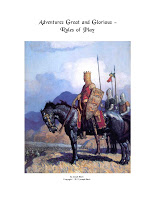In my previous post announcing the Adventures Great and Glorious project, Kenneth in the comments asked why I didn’t just refer to the Colony Game, the Power Game, and the Long Game as “the Domain Game”. It’s a good question deserving of an answer.
Simply put, I don’t see “the domain game” as a unified whole, nor do I see all of the three items I listed as necessarily being part of higher level play. Indeed, I see one of them (at least) as a completely stand-alone game by its nature.
For example, what I call “the Colony Game” is what most people think of when they think of the classic D&D end-game. It’s what was described in the DMG; clear territory of monsters, build a castle, farmers will arrive, and you can tax them.
However, that is a far cry from what I call “the Power game”, where you do not play an individual character but rather an entire faction within the economic, political, and religious structure of some state. In it, the struggle isn’t to start a new domain, but rather to exert influence over an already-existing constellation of factions, hopefully driving them to act in accordance with your own desires and in your interests. This is the element I see as most deserving of play as its own game in and of itself. I can see two parallel games being run in the same campaign world; one where players are individual characters doing what they normally do in RPGs, and the other where (perhaps a completely different set of) players are factions moving the campaign world forward in ways the game master could never have foreseen.
The third, which I call “the Long Game” is different yet still, and not in and of itself connected with either land clearing or power politicking. Rather, it deals with the rules of dynastic succession, courtly love, and the teaching and nurturing of the children of your player characters, who eventually become player characters themselves. Such a game has a very different rhythm than a traditional RPG, where events and adventures often take place at breakneck speed (relatively speaking). But nowhere does it say that when you start clearing land you automatically have to take a spouse and start hearing the pitter-patter of little fighters and mages, nor does a game that focuses on power politics necessarily have to span generations.
That’s not to say that I don’t see the three (plus the more conventional RPG situation) as mutually compatible and even mutually beneficial. I most certainly do, and there will be rules for combining the different “games”; the ultimate experience being, of course, the melding of all into a grand campaign spanning many different styles of play, dozens if not hundreds of different characters, and generations or even centuries of in-game play.
To lump all that together under the single heading of “the domain game” is to do each of the components a disservice, I think, and it would also serve as a bit of false advertisement for people who aren’t necessarily interested in seeing a Birthright retro-clone. The emphasis on modularity is deliberate.
Too, there is a certain level of expectation surrounding the term “domain game” and its association with Birthright; the bloodlines, regency points, etc. that Adventures Great and Glorious will not have. So again, by moving away from the term “domain game” I’m not setting up false expectations from people who would then be disappointed.
I hope that helps explain a little better the thought process behind AGG, and my attempt to differentiate the different elements within it.










Awww man, so no new Domain Powers? 🙁
More seriously though, thanks for the clarification behind the three… I must admit, I'm very, very intrigued by the prospect of a parallel-managed 'realms' game played (perhaps in bi-monthly turns or something) directly alongside a more traditional ADD game that takes place in the power-shifting world.
That's the Holy Grail of doing a "grand game" like this. What happens when a player from the regular ADD game gets control of one of the factions in the AGG game? What happens when the machinations of the AGG game begin to have a real influence on the players in the ADD game (wars starting, borders possibly shifting, guilds rising or falling)?
And, of course, it gives an explanation for where those "missions" come from that players are occasionally called upon to do; if the king from the AGG game has his daughter kidnapped by another faction, he could hire one of the ADD game players to recover her, for the ultimate sort of crossover game. People talk about having a "living, breathing" campaign world, but when you have those cross-cutting dynamics, varying different strata of play in a shared campaign setting, you get the real deal.
Can you tell I'm excited about the prospect?
You're excited?
I wondered what all that shouting an hollering from across-state was. Must've been you dancing on the rooftops again.
I'm intrigued. I've been a big fan of Birthright since it came out, and your perspective sheds some new light on the domain game.
I'm in.
The handout for the latest ADD game said there were 3 realms, a lichtenstein sized city state, and 2 or three churches. That's 5-6 players.
We can do it in the ADD forums 1 turn per week.